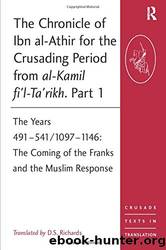The Chronicle of Ibn al-Athir for the Crusading Period from al-Kamil fi'l-Ta'rikh. Part 1 by Ibn al-Athir

Author:Ibn al-Athir [al-Athir, Ibn]
Language: eng
Format: epub
ISBN: 9780754640776
Publisher: Taylor and Francis
Published: 2017-03-02T08:00:00+00:00
Miscellaneous events
This year rainfall was interrupted and in much of the land there was a shortage of crops. The worst effects were in Iraq. Prices rose and the population of the SawÄd emigrated. People fed themselves on what was left after sieving. The situation of the citizens of Baghdad was worsened by the treatment they had from MankÅ«bars.
This year al-Mustarshid bi-AllÄh cancelled every unjust demand in the fief that was specific to him and ordered that nothing should be taken except what was according to ancient custom. He waived the tax-farm on gold thread. [545] The manufacturers of siglaton and gold brocade and others who worked with it used to meet with trouble and hardship from those that administered it.
The departure of the pilgrims was delayed this year, because of which there was a rumour that the pilgrimage from Iraq had been cancelled. The caliph appointed Emir Naáºar, the eunuch of Yumn, the commander of the army, and gave him the same authority over the pilgrimage that the commander of the army used to have. He also gave him the money that he would need for the journey and sent him on his way. They accomplished their pilgrimage and Naáºarâs competence was manifested.
Two large ships arrived with supplies and reinforcements for the Franks in Syria but they were wrecked and sank. The people had been fearful of the men they brought.
During this year the envoy of ĪlghÄzÄ«, the lord of Aleppo and MÄrdÄ«n, came to Baghdad to raise men to fight the Franks, telling of what they did to the Muslims in the lands of the JazÄ«ra, that they had seized a castle by Edessa and killed its emir, Ibn âUá¹ayr. Letters telling of this were sent to Sultan MaḥmÅ«d.
Also this year [the body of] al-Mustaáºhir was transferred to al-RusÄfa, along with all who were buried in the Caliphal Palace, including the grandmother of al-Mustaáºhir, al-MuqtadÄ«âs mother. Her death occurred after al-Mustaáºhirâs. She lived to see the fourth generation of her descendants.11
The situation of the urban gangs on the West Bank at Baghdad became serious this year. The prefectâs deputy crossed to deal with them leading fifty Turkish mamlukes. After a battle he fled from them. Then on the next day he crossed over again with two hundred mamlukes but did not subdue them. The gangs sacked Quá¹uftÄ12 on that day.
The following died this year:
In ShaâbÄn [17 November-15 December 1118] AbÅ«âl-Faá¸l Bakr ibn Muḥammad ibn âAlÄ« ibn al-Faá¸l al-Aná¹£ÄrÄ«, a descendant of JÄbir ibn âAbd AllÄh. Born in Bukhara, he was one of the outstanding ḤanafÄ« lawyers, an authority for that school of law.
AbÅ« ṬÄlib al-Ḥusayn ibn Muḥammad ibn âAlÄ« ibn al-Ḥasan al-ZaynabÄ«, the chief syndic at Baghdad, during á¹¢afar [June 1118]. He had retired from that office and been succeeded by his brother ṬirÄd. He was one of the leading [546] ḤanafÄ«s and transmitted much ḤadÄ«th.
In DhÅ«âl-Ḥijja [15 March-12 April 1119] AbÅ« ZakarÄ«yÄ YaḥyÄ ibn âAbd al-WahhÄb ibn Manda al-Iá¹£bahÄnÄ«, the renowned ḤadÄ«th expert from a family of ḤadÄ«th scholars.
Download
This site does not store any files on its server. We only index and link to content provided by other sites. Please contact the content providers to delete copyright contents if any and email us, we'll remove relevant links or contents immediately.
The History of Jihad: From Muhammad to ISIS by Spencer Robert(2622)
Nine Parts of Desire by Geraldine Brooks(2361)
The Turkish Psychedelic Explosion by Daniel Spicer(2355)
The First Muslim The Story of Muhammad by Lesley Hazleton(2268)
The Essential Rumi by Coleman Barks(2043)
1453 by Roger Crowley(2024)
The Last Mughal by William Dalrymple(1855)
Trickster Travels: A Sixteenth-Century Muslim Between Worlds by Davis Natalie Zemon(1847)
Muhammad: His Life Based on the Earliest Sources by Martin Lings(1644)
God by Aslan Reza(1639)
by Christianity & Islam(1629)
A Concise History of Sunnis and Shi'is by John McHugo(1567)
No God But God by Reza Aslan(1541)
Magic and Divination in Early Islam by Emilie Savage-Smith;(1533)
The Flight of the Intellectuals by Berman Paul(1502)
Nothing to Envy by Barbara Demick(1445)
Art of Betrayal by Gordon Corera(1429)
What the Qur'an Meant by Garry Wills(1391)
Getting Jesus Right: How Muslims Get Jesus and Islam Wrong by James A Beverley & Craig A Evans(1340)
